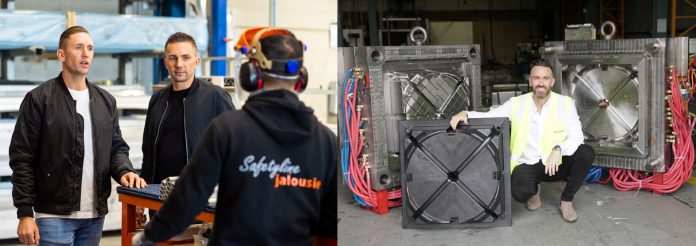
Media Release
During Australian Made Week, citizens are encouraged to support the efforts of local manufacturers, include dynamic young entrepreneurs who are driving Australia’s economic recovery through courageous, innovative leadership.
In April this year, an Australian Manufacturing Outlook report published by PROS revealed that 55 per cent of companies currently manufacturing overseas would return their manufacturing to Australia by 2023.
With more companies now choosing to expand or move operations back to Australia, one company that’s always operated onshore is Sydney-based louvre window manufacturer Safetyline Jalousie.
The family business, founded by brothers Leigh and Nathan Rust out of a two-car garage 11-years-ago recently sized up their operations into a 2000m2 facility to increase production capabilities.
“We’ve continued to grow and evolve as a company over the past year because there’s never been a more important time for businesses to manufacture their products locally,” said Leigh Rust.
“Despite the uncertainty that comes with a worldwide pandemic, I’ve remained positive about our plans for the future, because I know that we have the best people on our team to keep moving forward,” he said.
In addition to increasing their manufacturing capacity, Leigh has been lobbying the government to support local manufacturers – specifically in regards to stimulus funding and supporting the circular economy.
“We need to keep that money circulating within our local economy first before we send our taxes offshore,” he said.
Another manufacturing company that thrived during the pandemic as a result of its local manufacturing capabilities is another Sydney-based company, Holloway Group.
From concept development and design to mass manufacturing of premium, industrial-grade injection moulded products, Holloway Group helps businesses redefine what’s possible by bringing manufacturing home to Australia.
Holloway Group Director Matt Holloway said the pandemic was a blessing in disguise.
“As there became an increased focus on purchasing from local suppliers during the pandemic we were able to witness great benefits from this,” said Matt.
“We’ve seen an uptick in demand for local procurement of at least 50% as a result of people turning away from international suppliers.”
“To keep up with the demand, we have increased our operations by an additional 48 hours per week, working around the clock 24/7,” he said.
As part of the Holloway Group’s Bring It Home Campaign, which champions the importance of local manufacturing, the company secured Australian Made certification for its Geohex product made from 100 per cent recycled post-consumer plastics.
The environmentally-friendly, cost-effective Erosion Control System shows sustainability and value for money can be achieved through innovative design.
Mr Holloway said being an Australian-made, sustainable company is core to the company’s operations and something more companies should work towards.
“We’re proud to associate our quality products and brands with the Australian-made logo. It’s an iconic, instantly recognisable symbol that summarises the ingenuity and value of locally made products,” he says.
“As an advocate of Aussie manufacturing, using the AMC logo on Holloway Group products reaffirms our offer of Australian owned, Australian made.
The Australian Made Week, organised by the Australian Made campaign, encourages consumers to consider the effect of their purchasing decisions and buy from Australian-made suppliers.
Strengthening Australia’s onshore manufacturing capabilities, and supporting companies that have long held local manufacturing as a core pillar of their operations is a vital step in rebuilding the country’s economy.
By prioritising local manufacturing in the wale of Covid, Australia can decrease its reliance on international markets, placing the country in a stronger position moving forward.




















